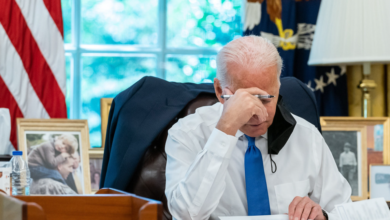Will Obama Go To War With Iran?

If the International Atomic Energy Agency’s (IAEA) November, 2011, report is correct, Iran will soon join the ranks of the world’s nuclear powers. Because of the Obama administration’s reluctance to confront this threat, others must begin preparing the case for a military strike to destroy Iran’s nuclear program. President Barack Hussein Obama has avoided Iran’s explicit military threats. Rather, he seeks to “isolate and increase the pressure upon the Iranian regime.” He naïvely hopes to negotiate a settlement with Tehran (and Venezuela, Cuba, and North Korea!), but he has ended up in the same place as his predecessor, George W. Bush, thus delaying the inevitable day of reckoning with Iran. Additionally, Obama doesn’t feel comfortable with employing the military, and going to war would discredit his claim that he was going to use “smart” diplomacy instead of saber-rattling.
As Obama continues to increase pressure on Iran in the hope that the government in Tehran will give up its nuclear program, the Iranians will respond to escalation with escalation. So far Obama has offered only sanctions. There is general agreement in the US on two points: (1) an Iranian nuclear weapons capability is “unacceptable,”and (2) the US prefers reaching an acceptable outcome without using force. There are three factors to consider when a US-Iran war is contemplated:
- Uncertainty: Not only may the US government not know the technical status of the Iranian nuclear program, or the actual state of readiness of Iranian forces, it may not know (or worse, have wrong) the decision-making and implementation protocols of the Iranian government, how the Iranian people and military would react to an attack, what Tehran would ask its allies and proxies to do, and what in fact they will do.
- Complexity: The number of factors in the war situation, such as actors, processes and the connections among them. Enemy disinformation can also set us on the wrong track. The enemy acts not just on the battlefield but also through an ability to influence our understanding of the situation by means of denial and deception. In this and other ways complexity reinforces uncertainty.
- War Itself: War involves simultaneous conflict in the military, diplomatic, economic and social domains on four levels: political, strategic, operational, and tactical. While a war with Iran might begin in the military domain, it would likely expand to others, and while it might begin at the operational or tactical level it would soon encompass strategic and political levels as well. There is a very great chance that, through suicide terrorist attacks, non-military may become directly involved.
Obama is married to the idea that nations can just sit down and talk about their problems with each other over a beer. Yet perhaps Obama has finally realized that his assumptions about the uses of diplomacy were incorrect. Obama may have come to the realization that Mahmoud Ahmadinejad might appear to be a clown, he is serious about acquiring nuclear weapons, and he is not interested in following the policy of “mutually assured destruction” (MAD) that has kept the nuclear powers from turning the entire planet into a burnt cinder. Obama and his advisers do not seem to be concerned with the deaths of anyone so long as their ideological goals are reached.
Obama, during the primary debates for the Democrat nomination, said that he would be glad to meet with any head of government without preconditions. Now we get word of a letter Obama sent to Iran’s supreme leader, Ayatollah Sayyed Ali Khamenei. The White House disputed Iranian reports that Obama sent a letter to Iran’s Supreme Leader offering direct bilateral talks. Regarding the letter, Iranian Member of Parliament Hojjatoleslam Hossein Ebrahimi said:
- … has described it [closing the Strait of Hormuz] as the United States’ red line that would provoke a response by the United States.
- … Obama has mentioned cooperation and negotiation based on the interests of the two countries.
- … He [Obama] has stated in the letter that they [the US] will not take any hostile action against the Islamic Republic of Iran.
- … This is not the first time that Obama has sent a message and letter to the Islamic Republic of Iran. He has repeatedly spoken in a soft tone about the Islamic Republic of Iran, but, in practice, he has not acted accordingly. Obama’s letter indicates that the United States has become afraid of the Islamic Republic of Iran’s might and has realized the point that an arrogant spirit is of no use, and therefore, he has softened his tone when speaking about the Islamic Republic of Iran.
The fourth consideration is our definition of victory. A regime-change goal would require a broad military offensive that could include nuclear facilities, air defenses, Iran’s retaliatory capabilities, leadership targets, regime supporters, and national infrastructure and economic targets. The more expansive a war’s goals as a plan escalates from strike to campaign to broad offensive, the greater the force needed to achieve those goals. The primary question is: if the politicians start a war, will they step back and let an unencumbered military fight it? If we look at recent history, it doesn’t look too promising.
But that’s just my opinion.
Access to other articles like this one can be found at RWNO, my personal web site.




